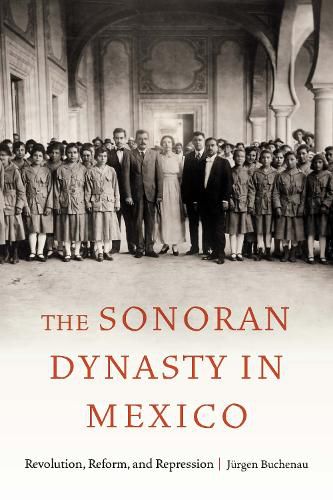Readings Newsletter
Become a Readings Member to make your shopping experience even easier.
Sign in or sign up for free!
You’re not far away from qualifying for FREE standard shipping within Australia
You’ve qualified for FREE standard shipping within Australia
The cart is loading…






Two generals from the northwestern state of Sonora, Alvaro Obregon and Plutarco Elias Calles, dominated Mexico between 1920 and 1934, having risen to prominence in the course of the Mexican Revolution. Torn between popular demands for ending the privileges of wealthy foreign investors and opposition by a hawkish U.S. administration and enemies at home, the two generals and their allies from their home state mixed radical rhetoric with the accommodation of entrenched interests.
In The Sonoran Dynasty in Mexico Juergen Buchenau tells the story of this ruling group, which rejected the Indigenous and Catholic past during the decades of the revolution and aimed to reinvent Mexico along the lines of the modern and secular societies in western Europe and the United States. In addition to Obregon and Calles, the Sonoran Dynasty included Adolfo de la Huerta and Abelardo L. Rodriguez, four Sonorans among six presidents in less than two decades. Although the group began with the common aims of nationalism, modernization, central political control, and enrichment, Buchenau argues that this group progressively fell apart in a series of bloody conflicts that reflected broader economic, political, and social disagreements. By analyzing the dynasty from its origins through its eventual downfall, Buchenau presents an innovative look at the negotiation of power and state formation in revolutionary Mexico.
$9.00 standard shipping within Australia
FREE standard shipping within Australia for orders over $100.00
Express & International shipping calculated at checkout
Two generals from the northwestern state of Sonora, Alvaro Obregon and Plutarco Elias Calles, dominated Mexico between 1920 and 1934, having risen to prominence in the course of the Mexican Revolution. Torn between popular demands for ending the privileges of wealthy foreign investors and opposition by a hawkish U.S. administration and enemies at home, the two generals and their allies from their home state mixed radical rhetoric with the accommodation of entrenched interests.
In The Sonoran Dynasty in Mexico Juergen Buchenau tells the story of this ruling group, which rejected the Indigenous and Catholic past during the decades of the revolution and aimed to reinvent Mexico along the lines of the modern and secular societies in western Europe and the United States. In addition to Obregon and Calles, the Sonoran Dynasty included Adolfo de la Huerta and Abelardo L. Rodriguez, four Sonorans among six presidents in less than two decades. Although the group began with the common aims of nationalism, modernization, central political control, and enrichment, Buchenau argues that this group progressively fell apart in a series of bloody conflicts that reflected broader economic, political, and social disagreements. By analyzing the dynasty from its origins through its eventual downfall, Buchenau presents an innovative look at the negotiation of power and state formation in revolutionary Mexico.